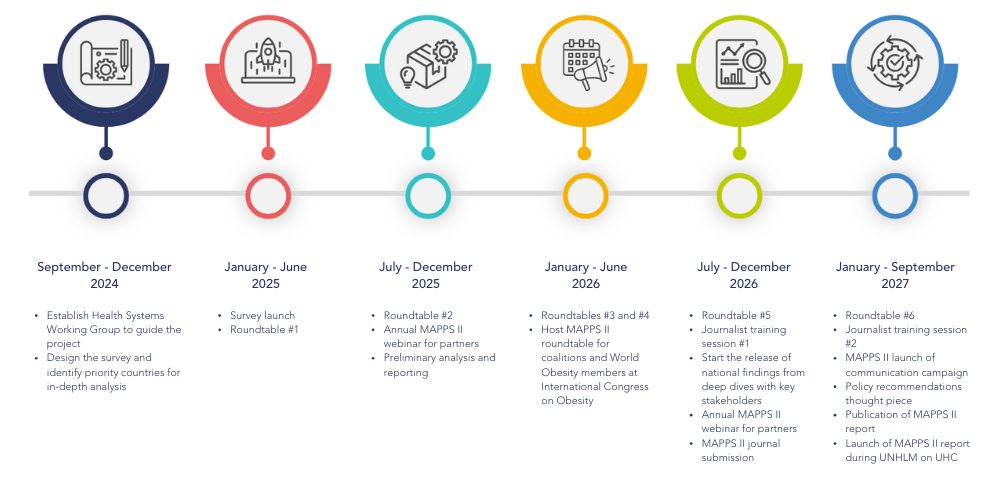MAPPS II - Understanding the global barriers to addressing obesity
We are very excited to launch the Management and Advocacy for Providers, Patients, and Systems (MAPPS) II Project
MAPPS II is a global research study to review how well-equipped countries are for managing obesity in health systems and beyond.
Background
As the 2025 deadline for UN global noncommunicable disease (NCD) targets and the 2030 deadline for Sustainable Development Goals NCD and obesity targets approach, there is unprecedented urgency to address obesity as a global health crisis. While new evidence and management options are changing the obesity narrative, fragmented responses to obesity as a disease and driver of other diseases remain the norm.
The multiple roots of obesity require an integrated approach, but many countries are failing to appropriately resource integration of essential obesity services into the health system. Lack of prioritisation of obesity means that access to adequate and quality obesity care remains a challenge in both high-income and lower- and middle-income countries.
By 2035, 2 billion people are expected to be living with obesity worldwide.
It is clear that obesity in health systems requires a spotlight commensurate with the scale of the population it affects, and so obesity must be discussed in Global Forums and High-Level Meetings on NCDs and nutrition, health financing, Universal Health Coverage, and more as we approach the deadlines of global (and national) obesity and NCD targets. In order to develop effective solutions, we must first investigate and understand how different health systems function in relation to obesity, and identify the barriers to care and prevention.
Why is MAPPS important?
In 2018 – 2019, we undertook the first MAPPS study which focused mainly on care and management, and produced the following key findings, based on research undertaken in 68 countries:
- There was a lack of recognition of obesity as a disease by governments and healthcare providers
- Countries had varying approaches to funding treatment
- Most patients entered the system via primary care, but lack of referral was the most common reason for leaving the system
- Professional training for obesity care was inadequate
- Perceived barriers to treatment included lack of political will and training for HCPs, cost of treatment, stigma and more


But the policy and treatment landscape has changed, and thus, to address the critical acceleration of obesity worldwide, the World Obesity Federation is embarking on an enhancement, extension and update of the previous MAPPS project that will span 3 years (2024 – 2027). The in-depth knowledge and insight gained can be applied to inform policy reform and achieve global milestones – with the ultimate goal of improving access to obesity care and prevention for all.
MAPPS II Objectives
Key objectives of MAPPS II are:
- Improve understanding of the global obesity policy and care landscape, including an analysis of differences across countries, regions, and income levels.
- In-depth knowledge and insights on equity and access gathered in six ‘deep dive’ countries to support cross-country learning.
- Map and engage diverse stakeholders in MAPPS II research and dissemination.
- Leverage World Obesity Day (and other global campaigns) and World Obesity Atlas(es) to advance and disseminate knowledge established to date.
- Alignment of MAPPS II inputs and outputs with the WHO Acceleration Plan to ensure comprehensive and aligned policy.
MAPPS II will engage lived experience voices, patient groups, healthcare professionals and advocacy groups to ensure a holistic understanding of obesity prevention and care.
Project Timeline (subject to change)
A high-level overview of the anticipated timeline is as follows:


Project Outputs:
- Briefings and presentations - Key global, regional and national events will feature briefings, presentations, and statements to communicate the research findings
- Academic publication(s) - An academic paper detailing the findings will be produced. Thought and editorial pieces focusing on the global obesity landscape and health equity will be published in reputable journals.
- Country report cards - Findings will be reported in individual country report cards to provide specific insights and recommendations.
- World Obesity Day Atlas 2027 - The findings will be a focal point of the 2027 World Obesity Day Atlas.

Project Outputs (continued):
- Evidence-based Recommendations - Co-produced with key stakeholders and the Health Systems Working Group, these recommendations will be published to guide policy and practice.
- World Obesity Day Events: World Obesity members will organise events worldwide for World Obesity Day, with focused support on MAPPS II findings and initiatives.
- Coordinated Communication Campaign - To include media training for journalists, think pieces and editorials by the Working Group and leveraging of opportunities at global health events and campaigns, such as World Obesity Day and the 2027 UN High-Level Meeting on Universal Health Coverage.


Enabling better planning and capacity building globally
While obesity has emerged as one of the biggest global health challenges currently facing the world, the gaps in knowledge and understanding of how it is addressed and prioritised by countries are significant.
MAPPS II will enable better planning and capacity building to ensure that obesity is embedded in health systems and policies across all countries.
Find out more and get involved
If you would like to know more about the MAPPS II project, please get in touch with us at health_systems@worldobesity.org.
Contact us